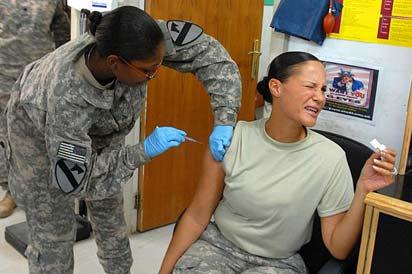A new Defense Health Agency (DHA) will come to life Oct. 1, armed with new authorities to control health costs by cutting waste and duplication across the separate medical departments of Army, Navy and Air Force.
DHA is tasked to streamline delivery of care, recapture thousands of patients for the direct care system from purchased care contractors, combine common support functions and standardize health care business practices.
Its power and effectiveness will evolve over time, said Dr. Jonathan Woodson, assistant secretary of defense for health affairs, in a phone interview to explain how this first major restructuring of the military health care system in decades will impact its 9.7 million beneficiaries.
One impact will be greater access to military facilities, particularly in areas where beneficiaries are most concentrated. Usage of base hospitals has dropped to about 33 percent of capacity, a trend aggravated by years of war when medical staffs routinely deployed to care for wounded in theater.
Meanwhile, many more beneficiaries came to rely on TRICARE networks of civilian providers or on private sector doctors who would accept patients using TRICARE Standard, the fee-for-service option.
Under DHA, the goal is to increase base hospital usage to reach at least 70 percent of capacity, Woodson said, because care in the military system costs about a third less than TRICARE purchased care.
Woodson stressed that the goal is to "optimize dollars invested into the direct care system." It is not to deny beneficiaries access to care "when they need it from the purchased care market."
Perhaps the greater potential for cost-savings under DHA will be its control of 10 "shared services" of military health care. It will start with five. TRICARE support contracts and pharmacy operations already are centrally managed. DHA will assume those responsibilities. It also will control medical facilities planning, medical logistics and health information technology.
Sometime in 2014 or early 2015, it also will assume responsibility from the services for: medical education and training; research and development; acquisition and contracting; budgeting and resourcing; public health. Plans are to reach full operational capability of all shared services by fall 2015.
"In the future, we will build our hospitals and clinics using the same analytics," said DHA's first director, Air Force Lt. Gen. (Dr.) Douglas J. Robb. "We'll buy supplies, equipment and services from common contracts. We'll train in even more common ways. Army, Navy and Air Force personnel will be able to work in any medical facility in the world without needing to learn a whole new way of doing business."
Robb was chief medical adviser to the Joint Chiefs before taking charge of TRICARE Management Activity (TMA) July 1 where he has supervised transition to DHA. TMA will cease to exist Oct. 1.
Woodson said a "conservative" estimate of cost savings from DHA control of shared services is $3.4 billion over the agency's first five years.
Seventeen studies of the military health care system, dating back to the Truman era, urged greater integration of services, Woodson said. Two years ago, the deputy secretary of defense ordered a task force of department civilian and military leaders, both line officers and medical officials, to create a framework for reform. After four months of intense study and debate, it agreed on the DHA model.
Participants rejected other alternatives including creation of a Unified Medical Command to replace the three service medical departments, as many outside studies had recommended.
"That would have been a much more complex undertaking than many people recognize, and it was projected to be more expensive than the status quo," Woodson said.
In settling on the DHA concept, the task force also identified those shared services with the best opportunities to realize significant cost savings.
"Then, as we tried to begin to eat this elephant," Woodson said, "it was clear we had to have a schedule to bring them on board…We can't just flip the switch on all these shared services at the same time without running the chance of breaking something."
Another critical part of restructuring a more efficient health system is jointly managing staffs and resources in areas where two or more services operate major medical facilities and serve large beneficiary populations. So with the launch of DHA, six "enhanced multiservice markets" also are being created. Each will have flag or general officer in charge locally to integrate resources and adhere to five-year marketing plans developed jointly.
These enhance markets are the Washington D.C. area; San Antonio, Texas; Colorado Springs, Colo.; the Puget Sound region of Washington State; the Tidewater area of Virginia, and Oahu Island in Hawaii.
Controlling costs in these locales is critical. They provide more than half of all inpatient care delivered through military hospitals, and manage 40 percent of all TRICARE Prime beneficiaries enrolled for care at base facilities.
As more military specialists are reassigned to these population centers, where they can treat more patients and keep skills sharp, beneficiaries at smaller base hospitals may be referred more often to civilian providers for their specialty care.
To understand how this saves money, consider a military surgeon who performs an average of 10 operations a month at a small base hospital. That same surgeon might perform two or three times as many procedures at a larger market like San Diego, thus expanding overall patient access to in-service care.
Before specialists are shifted in this way, DHA and the services would ensure that local TRICARE networks can provide quality surgical services or whatever type of care beneficiaries at smaller bases will need.
Both Woodson and Robb said all the services understand and fully support DHA, enhanced markets and the goal of controlling health costs.
"Internal team members, from surgeons general down, are pursuing the same objectives. Turf fights are from another era," Woodson said.
To comment, write Military Update, P.O. Box 231111, Centreville, VA, or email milupdate@aol.com or twitter: Tom Philpott @Military_Update










